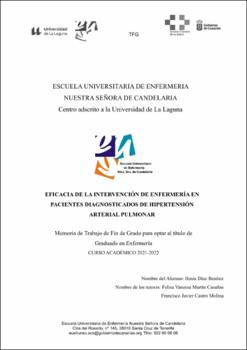Eficacia de la intervención de enfermería en pacientes diagnosticados de hipertensión arterial pulmonar.
Autor
Díaz Benítez, IleniaFecha
2022Resumen
La hipertensión arterial pulmonar (HP) es una enfermedad compleja y poco común caracterizada por una
presión elevada de los vasos sanguíneos que transportan la sangre entre el corazón y los pulmones.
Generalmente, la HP puede afectar a personas de cualquier edad, con una mayor incidencia entre los 30 y 50
años y, por causas que aún se desconocen, en el sexo femenino. El hecho de que la HP sea una enfermedad
progresiva con una baja supervivencia, con un tratamiento que no es eficaz en su totalidad, hizo que me
cuestionara el papel de la enfermera en el seguimiento de estos pacientes y la posibilidad de que sus
intervenciones en educación para la salud contribuyeran a una mejora de la clase de funcional de estos. El
proyecto busca averiguar si es posible la mejora de la calidad de vida de los pacientes mediante la realización
de diferentes talleres educativos en los que se trabajaran tres enfoques importantes para un buen control de la
enfermedad: la dieta, la actividad física y la adherencia al tratamiento. La ejecución de este proyecto se va a
llevar a cabo en el Hospital Universitario de Canarias, en la "Unidad de Insuficiencia Cardíaca". Se trata de un
estudio de intervención prospectivo y cuantitativo, pretest-postest, en el que se valora la eficacia de la
intervención enfermera a través de cuestionarios (Kansas City y Barthel) y la realización del test de la Marcha.
El objetivo principal del estudio es desarrollar un programa educativo que no se base en la mera transmisión
de conocimientos, sino que vaya un punto más allá y busque la implicación y empoderamiento del paciente, a
través de su participación. Las variables dependientes del estudio son los resultados obtenidos en el test de la
Marcha, el test de Barthel y el test de Kansas City, y la variable independiente del estudio es la intervención
educativa a la que se someterán las pacientes relacionadas con la actividad física, la dieta y la adherencia al
tratamiento. Las variables sociodemográficas serían pacientes con edades comprendidas entre los 20 y 70
años, que residan en la isla de Tenerife. Los resultados a corto plazo que se esperan obtener tras la realización
de los talleres educativos son mejorar el nivel de conocimiento de los pacientes sobre la HP y mejorar el autocuidado del paciente diagnosticado de HP. Sin embargo, los resultados a largo plazo que se esperan
obtener son mejorar el régimen terapéutico de los pacientes, mejorar los hábitos de vida saludable de los
pacientes y mejorar la calidad de los pacientes diagnosticados de HP. Pulmonary arterial hypertension (PH) is a rare and complex disease characterized by elevated pressure in the
blood vessels that carry blood between the heart and lungs. Generally, PH can affect people of any age, with a
higher incidence between 30 and 50 years and, for reasons that are still unknown, in females. The fact that PH
is a progressive disease with poor survival, with a treatment that is not fully effective, made me question the role
of the nurse in the follow-up of these patients and the possibility that their educational interventions for health
will contribute to an improvement in their functional class. The project seeks to find out if it is possible to improve
the quality of life of patients by carrying out different educational workshops in which three important approaches
for good control of the disease will be worked on: diet, physical activity and adherence to treatment. treatment.
The execution of this project will be carried out at the University Hospital of the Canary Islands, in the "Heart
Failure Unit". This is a prospective and quantitative intervention, pretest-posttest, in which the efficacy of the
nursing intervention study is assessed through questionnaires (Kansas City and Barthel) and the performance
of the walk test. The main objective of the study is to develop an educational program that is not based on the
mere transmission of knowledge but goes a step further and seeks the involvement and empowerment of the
patient, through their participation. The dependent variables of the study are the results obtained in the walk test,
the Barthel test and the Kansas City test, and the independent variable of the study is the educational
intervention to which the patients related to physical activity will undergo, diet and adherence to treatment. The
sociodemographic variables will be patients aged between 20 and 70 years, who reside on the island of Tenerife.
The short-term results that are expected to be obtained after carrying out the educational workshops are to
improve the level of knowledge of the patients about PH and to improve the self-care of the patient diagnosed
with PH. However, the long-term results that are expected to be obtained are to improve the therapeutic regimen
of patients, improve the healthy lifestyle of patients and improve the quality of patients diagnosed with PH.





